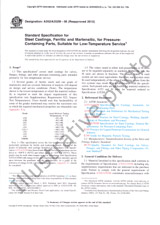We need your consent to use the individual data so that you can see information about your interests, among other things. Click "OK" to give your consent.
ASTM E1817-08(2022)
Standard Practice for Controlling Quality of Radiological Examination by Using Representative Quality Indicators (RQIs)
Translate name
STANDARD published on 1.12.2022
The information about the standard:
Designation standards: ASTM E1817-08(2022)
Publication date standards: 1.12.2022
SKU: NS-1097235
The number of pages: 3
Approximate weight : 9 g (0.02 lbs)
Country: American technical standard
Category: Technical standards ASTM
The category - similar standards:
Annotation of standard text ASTM E1817-08(2022) :
Keywords:
radiologic images, representative quality indicator, RQI,, ICS Number Code 19.100 (Non-destructive testing),77.040.20 (Non-destructive testing of metals)
Additional information
| Significance and Use | ||||||||||||||||||
|
5.1?The use of RQIs is a significant departure from normal practice in industrial radiology because it is not a standard design and is dependent on the application, material, and process and therefore cannot be a simple plaque or wire. The use of an RQI provides documented evidence that radiologic images have the level of quality necessary to reveal those nonconformances for which the parts are being examined by ensuring adequate spatial resolution and contrast sensitivity in the areas of interest. 5.2?Where conventional IQIs conforming to Practice E747 or E1025 can be used effectively, those practices should be followed. |
||||||||||||||||||
| 1. Scope | ||||||||||||||||||
|
1.1?This practice covers the radiological examination of unique materials or processes, or both, for which conventionally designed image quality indicators (IQIs), such as those described in Practices E747 and E1025, may be inadequate in controlling the quality and repeatability of the radiological image. 1.2?Where appropriate, representative image quality indicators (RQIs) may also represent criteria levels of the acceptance or rejection of images of discontinuities. 1.3?This practice is applicable to most radiological methods of examination. 1.4?This standard does not purport to address all of the safety concerns, if any, associated with its use. It is the responsibility of the user of this standard to establish appropriate safety, health, and environmental practices and determine the applicability of regulatory limitations prior to use. 1.5?This international standard was developed in accordance with internationally recognized principles on standardization established in the Decision on Principles for the Development of International Standards, Guides and Recommendations issued by the World Trade Organization Technical Barriers to Trade (TBT) Committee. |
||||||||||||||||||
| 2. Referenced Documents | ||||||||||||||||||
|
We recommend:
Technical standards updating
Do you want to make sure you use only the valid technical standards?
We can offer you a solution which will provide you a monthly overview concerning the updating of standards which you use.
Would you like to know more? Look at this page.




 Cookies
Cookies
